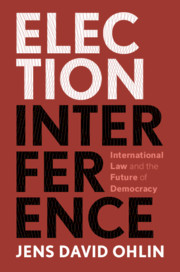Book contents
- Election Interference
- Election Interference
- Copyright page
- Dedication
- Contents
- Acknowledgements
- Introduction
- 1 What Is Election Interference?
- 2 Election Interference Is Not Cyber-War
- 3 Limits of the Sovereignty Framework
- 4 The Promise of Self-Determination
- 5 Foreign Electioneering and Transparency
- 6 Free Speech and Elections
- 7 The Value of Criminal Prosecutions
- 8 Soliciting Foreign Interference
- Conclusion
- Index
5 - Foreign Electioneering and Transparency
Published online by Cambridge University Press: 09 June 2020
- Election Interference
- Election Interference
- Copyright page
- Dedication
- Contents
- Acknowledgements
- Introduction
- 1 What Is Election Interference?
- 2 Election Interference Is Not Cyber-War
- 3 Limits of the Sovereignty Framework
- 4 The Promise of Self-Determination
- 5 Foreign Electioneering and Transparency
- 6 Free Speech and Elections
- 7 The Value of Criminal Prosecutions
- 8 Soliciting Foreign Interference
- Conclusion
- Index
Summary
The goal of this chapter is to connect the existing prohibitions on foreign participation in elections, that is, to demonstrate that the familiar regulations – prohibitions on foreign voting and spending, as well as registration statutes – should be viewed as methods to protect the collective entity’s exercise of its right of self-determination. Then, once these regulations are understood in this light, a conceptual space opens up to ask whether additional boundary regulations might be enacted in order to secure electoral integrity in the face of foreign election interference. Specifically, this chapter will discuss transparency regimes that might help identify electioneering that originates from foreign sources. The existing regulations target non-citizen voting and foreign spending, but as the Special Counsel indictment against the IRA demonstrated, it is often hard to enforce these regulations against foreign actors located outside the United States. For this reason, it is important to consider other methods of signaling to the public that election speech, such as social media posts, have originated from outside the polity.
Keywords
- Type
- Chapter
- Information
- Election InterferenceInternational Law and the Future of Democracy, pp. 118 - 146Publisher: Cambridge University PressPrint publication year: 2020
- 1
- Cited by

